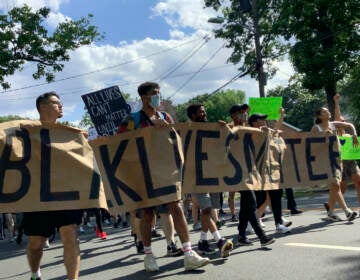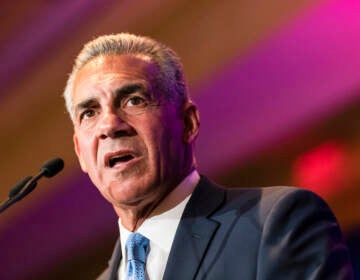N.J. advocates urge close look at state police culture before more troopers are added
Citing a history of racial discrimination, advocates say the Murphy administration should hear their concerns before adding more state troopers.

A close-up of a New Jersey State Police Officer's uniform. (Edwin J. Torres/Governor’s Office)
From Princeton to Cape May, what do you wonder about South Jersey, its people, and its culture that you want WHYY to investigate? Let us know here.
Advocates in New Jersey say a conversation with the community needs to happen before more state troopers are added to the state police force.
The governor announced last week that there will be a second class of state troopers next year. With at least 100 troopers becoming eligible to retire in October, and more qualifying in 2023, Murphy said the size of the force needs to increase to ensure that state trooper levels can be maintained through attrition.
“They shouldn’t do another step of using our taxpayers’ money [and do] no recruiting at all,” said Steven Young, president of the South Jersey chapter of the National Action Network. He questioned why alternatives to increasing the force aren’t being considered.
“Why not assist the community with policing their own community,” he asked. “If there’s a solution to do that, why aren’t we spending money with that?”
Marleina Ubel, a state policy analyst and fellow with New Jersey Policy Perspective, expressed a similar sentiment. She said there is an opportunity “to do something truly transformative” with the American Rescue Plan money that is partly funding the additional troopers.
“Invest in alternative response professionals, mental health professionals, [and] behavioral health professionals … they’re trained to respond to these particular kinds of crises that will not lead to excessive use of force or unnecessary death,” Ubel added.
Advocates have expressed disappointment in politicians who have opted to invest more in policing after standing beside them during protests against the police murder of George Floyd two years ago, acknowledging reform is needed.
Also in the background is a history going back more than three decades of New Jersey State Police struggling to deal with racial discrimination. Recent data shows that Black and Latino drivers are more likely to get searched, cited, and arrested by state troopers compared to white drivers. It also shows that troopers are more likely to use force against Black and Latino drivers.
There have also been allegations of disparate treatment of Black troopers. A coalition led by the Greater Newark chapter of the National Action Network, among others, is working with some troopers who say they were discriminated against and terminated due to state police practices.
The governor said an additional trooper class can ensure “a state police force that better mirrors our state’s diversity.” Ubel said while recruiting to increase diversity is always “an effort worth looking at,” state police culture needs to be examined and fixed.
“Hiring people of color does not address the problems that caused those disparities in the first place,” she said. “There are reasons why we do not have a police force that is reflective of our community, and we need to understand why that is happening.”
Young said that policies and procedures need to change before more troopers are recruited. He said it should start with a meeting with the community to discuss their concerns, but not just with the same community leaders.
“If they are going to be selective about the people that they meet with, you defeated the purpose,” Young said, adding “there’s a problem” when “it’s the same people … the same faith-based leaders [and] same civil rights leaders, and you get the same results.”

Get daily updates from WHYY News!
WHYY is your source for fact-based, in-depth journalism and information. As a nonprofit organization, we rely on financial support from readers like you. Please give today.







